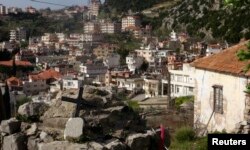KASAB, SYRIA —
Residents of the Armenian Christian village of Kasab on Syria's border with Turkey began returning home on Monday, dancing, cheering and waving flags in the main square a day after the army retook the area from rebels.
The fall of Kasab to President Bashar al-Assad's forces less than three months after insurgents captured it dealt another symbolic and strategic blow to an opposition undermined in recent months by infighting and government gains.
Syrian state television has broadcast footage from the village, saying “security and stability” had been restored after the area was cleared of “terrorists,” the government's standard term for the rebels fighting to overthrow Assad.
A field commander in the Syrian army told Reuters the area including the border crossing had come under full control of government forces after they struck at rebel storehouses and supply routes and seized a tract overlooking the village.
“The terrorist groups in Kasab had two choices: flee to Turkish territory, or die beneath the blows of the Syrian army,” he told Reuters during a government-organized visit to Kasab, declining to give his name.
A Reuters reporter saw dozens of residents returning, with some kicking up their heels in the village's main square, raising Syrian flags and surveying damage inflicted on some of the village's buildings, including churches.
“We came back today because we heard the army had liberated the village,” said Sausa Nadra, a Kasab resident who had fled to the coastal city of Latakia after the rebel advance.
“There's damage, destruction, there are some upsetting things, but we're happy we were able to come back after a short time. It didn't take a long time like in other areas,” she said.
Handwritten slogans covered walls, although it was not clear who exactly had written them. “We want an Islamic state. God is greatest,” one of the slogans read.
Many of the rebels who seized Kasab in March were hardline Islamists including some from al-Qaida's Syrian branch, the Nusra Front.
In addition to its position on the Turkish border, the village was important for the insurgents because it is located in the heartland of Assad's minority Alawite sect, an offshoot of Shi'ite Islam, along the Mediterranean coast.
Lama Deeb, another resident of Kasab, praised the armed forces for regaining control of the village as soldiers and other security forces stood nearby.
“We thank God. May God protect our army and everyone who is holding a gun in defense of the country,” she said.
Over 160,000 people have been killed in Syria's conflict, which began over three years ago as a peaceful protest movement but turned into a civil war after a government crackdown.
The war has taken on a starkly sectarian character, with the overwhelmingly Sunni Muslim rebels backed by Sunni Gulf Arab powers fighting to overthrow Assad, who is backed by Shi'ite Iran.
The fall of Kasab to President Bashar al-Assad's forces less than three months after insurgents captured it dealt another symbolic and strategic blow to an opposition undermined in recent months by infighting and government gains.
Syrian state television has broadcast footage from the village, saying “security and stability” had been restored after the area was cleared of “terrorists,” the government's standard term for the rebels fighting to overthrow Assad.
A field commander in the Syrian army told Reuters the area including the border crossing had come under full control of government forces after they struck at rebel storehouses and supply routes and seized a tract overlooking the village.
“The terrorist groups in Kasab had two choices: flee to Turkish territory, or die beneath the blows of the Syrian army,” he told Reuters during a government-organized visit to Kasab, declining to give his name.
A Reuters reporter saw dozens of residents returning, with some kicking up their heels in the village's main square, raising Syrian flags and surveying damage inflicted on some of the village's buildings, including churches.
“We came back today because we heard the army had liberated the village,” said Sausa Nadra, a Kasab resident who had fled to the coastal city of Latakia after the rebel advance.
“There's damage, destruction, there are some upsetting things, but we're happy we were able to come back after a short time. It didn't take a long time like in other areas,” she said.
Handwritten slogans covered walls, although it was not clear who exactly had written them. “We want an Islamic state. God is greatest,” one of the slogans read.
Many of the rebels who seized Kasab in March were hardline Islamists including some from al-Qaida's Syrian branch, the Nusra Front.
In addition to its position on the Turkish border, the village was important for the insurgents because it is located in the heartland of Assad's minority Alawite sect, an offshoot of Shi'ite Islam, along the Mediterranean coast.
Lama Deeb, another resident of Kasab, praised the armed forces for regaining control of the village as soldiers and other security forces stood nearby.
“We thank God. May God protect our army and everyone who is holding a gun in defense of the country,” she said.
Over 160,000 people have been killed in Syria's conflict, which began over three years ago as a peaceful protest movement but turned into a civil war after a government crackdown.
The war has taken on a starkly sectarian character, with the overwhelmingly Sunni Muslim rebels backed by Sunni Gulf Arab powers fighting to overthrow Assad, who is backed by Shi'ite Iran.












